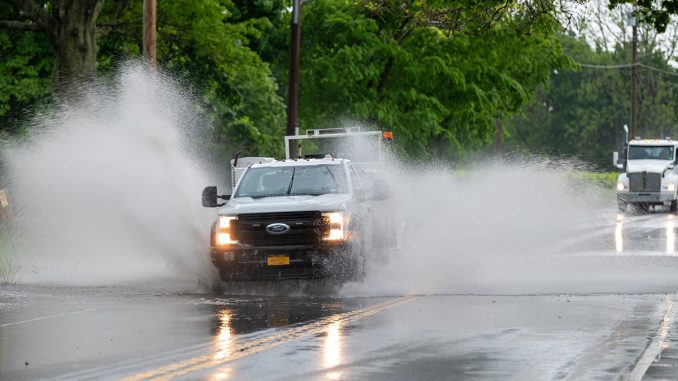
Last week, Dan Goodwin, Southold Town’s highway superintendent, didn’t feel good about the storm story that popped up on his phone. The New York Times story began this way:
“In yet another dire warning about the coming Atlantic hurricane season, the National Oceanic and Atmospheric Administration on Thursday predicted that this year could see between 17 to 25 named tropical cyclones, the most it has ever forecast in May for the Atlantic Ocean.
“The NOAA forecast joins more than a dozen other recent projections from experts at universities, private companies and other government agencies that have predicted a likelihood of 14 or more named storms this season; many were calling for well over 20.”
According to the story, a NOAA administrator said four to seven of those storms could be Category 3 hurricanes or higher – with winds of at least 111 m.p.h.
Across eastern Long Island, officials and others who watch the ebb and flow of tides with rising concern have seen a number of very high tides that were not connected to either full moons, nor’easters or other storms. In both Riverhead and Southold, officials said low-lying streets have seen flooding that required road closures.
Vulnerable waterfront communities like Komogener Point in New Suffolk saw more than one high tide that surrounded the homes on the narrow finger of land where West Creek meets Peconic Bay. More than one of those tides saw bay water pour across New Suffolk Beach and flood the intersection of Jackson Street and 1st Street, home to a Post Office, businesses and a restaurant.
“One of the factors amongst many that fuel a hurricane is ocean water temperature, and scientists have said that they have recorded the highest North Atlantic water temps on record in March,” Mr. Goodwin said. “Historically, as a storm moves up the coast and gets into cooler water they tend to lose energy, versus what they were in the tropics.”
The NOAA report specifically cites Atlantic Ocean temperatures as a cause of worry, as warmer ocean temperatures can energize a tropical storm into a full-blown hurricane and power it farther north. One expert in the Times story described water conditions as “unprecedented” and “alarming.”
The birthplace of most Atlantic hurricanes is between West Africa and Central America, where water temperatures are “hotter this year than before the start of last year’s hurricane season, which produced 20 names storms,” according to the Times story.
For Goodwin, whose crews are responsible for town-owned roads, the predictions raise the alarm for what could be ahead.
“As with nearly any storm system that moves near us, the flooding we can experience is a major concern,” he said. “As documented this year, we have areas that lose access and roads that become flooded; this is without a tropical storm or hurricane. Granted we have had some pretty intense nor’easters, but as the intensity of a storm increases the flooding situations as a result are not going to get any better.”
Mr. Goodwin said that when he speaks to residents and civic groups, he stresses the need to be prepared for coming storms. “Everyone family that lives here has a unique and personal set of circumstances and needs,” he said. “It could be that they need certain medications or care, live in a flood-prone area or heavily wooded area. Some of the residents are new to the area and don’t understand what effects a large powerful storm could do to their property or the infrastructure they rely on.
“Hurricane season starts June 1 and I hope that people start thinking about these type storms and assessing their own factors and properties at that point,” he added. “The time to do it is definitely not going to be when we have a storm closing in on the area.”
Southold Supervisor Al Krupski said North Fork residents should be prepared.
“Heavy winds bring down trees, wires and poles, blocking roads,” he said. “Flooding is made worse by sea level rise, which blocks roads. We can prepare by being ready, having fuel in your car, food in your house, and a reliable water source. If your electricity goes off for a few days, accept that you can survive without it on a temporary basis.
“If you have family members with special medical needs, make your preparations today for moving to an emergency facility,” he said. “Help your community members if you can do so safely. Make sure that you are in a safe place during a storm so you do not have to put fire and police personnel at risk during the storm. Stay off the road to let the crews safely clear debris.”
He said climate change has made the threat of severe storms worse. “We need to adjust our behavior to adapt and support efforts to make us more climate resilient,” he said.

